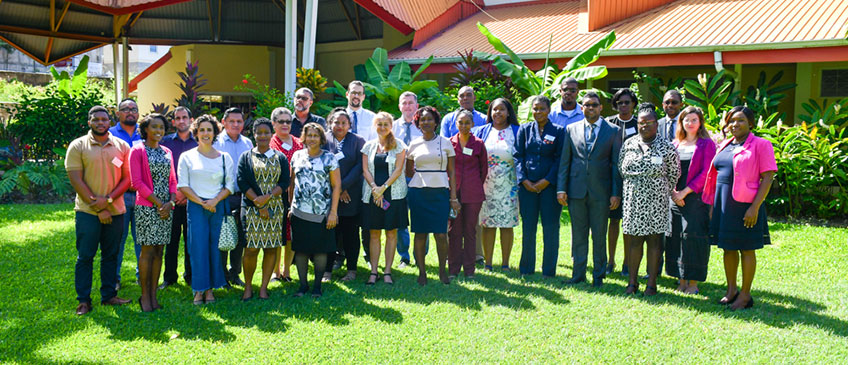Regional Workshop on Environment Statistics and Climate Change Statistics for the CARICOM Region
- St. George's, Grenada
- 4-8 November 2019
UNSD organized a Workshop on Environment Statistics and Climate Change Statistics for the Caribbean Community (CARICOM) Region, in collaboration with the CARICOM Secretariat that took place in St. Georges, Grenada from 4 to 8 November 2019. The Workshop was hosted by the Central Statistical Office of Grenada. Several international, inter-governmental and regional organizations participated in the Workshop, including the Food and Agriculture Organization of the United Nations (FAO), the United Nations Framework Convention on Climate Change (UNFCCC), and the Regional Collaboration Centre of the United Nations Framework Convention on Climate Change (UNFCCC-RCC), the United Nations University (UNU), and the Economic Commission for Latin America and the Caribbean (ECLAC).
The Workshop offered technical knowledge to statisticians from the National Statistical Offices and experts in the Ministries of Environment (or equivalent institutions) in countries in the region that have already embarked on environment statistics and were ready to receive further and in-depth training on the latest methodologies in environment statistics. Building on previous collaborative regional work undertaken by UNSD and CARICOM in environment statistics, the Workshop aimed at providing detailed knowledge and understanding of the subject, thus allowing participants to identify gaps in environmental data, and contribute to the production of regular, accurate and reliable environment statistics that can allow developing environmental indicators and accounts relevant to policy making and SDGs monitoring.
The Workshop was part of UNSD's regular programme of technical cooperation to support the implementation of the Framework for the Development of Environment Statistics (FDES 2013) in Member States following the 44th session of the Statistical Commission's endorsement of the FDES 2013 as the framework for strengthening environment statistics programmes in countries. The workshop consisted of a series of experts' presentations, sharing of and discussion of lessons learned from country practices, and facilitated group discussions. UNSD presentations covered, inter alia, the conceptual foundation and the structure of the FDES 2013, strategic pillars and steps to implement the FDES 2013, and details of environment statistics particularly relevant for the region (i.e. waste, water, and climate change). FDES 2013 supporting materials, such as the Environment Statistics Self-Assessment Tool (ESSAT), were also presented and discussed. FAO, UNFCCC, UNFCCC-RCC, UNU and ECLAC also provided substantive technical contributions in their respective subject matters. Participants appreciated the guidance received towards the implementation of the FDES 2013 and the Environment Statistics Self-Assessment Tool (ESSAT) in their countries. Climate change statistics and indicators were also discussed given the mandate from the 47th session of the Statistical Commission that UNSD develop a global set of climate change statistics and indicators. In addition, the UNSD/UNEP Questionnaire on Environment Statistics and the environmentally-related SDG indicators were also addressed. Finally, the Workshop discussed and adopted a key set of recommendations on the way forward.
Meeting documents
- Agenda
- Information Brochure
- List of participants
- Final Report
Session 1: Framework for the Development of Environment Statistics (FDES 2013)
- CSO Grenada - Experience with Environment Statistics
- CARICOM - Status and Needs of Environment Statistics in the Region
- UNSD - International Requirements for Environment Statistics
- UNSD - Conceptual foundation and structure of the FDES
- UNSD - Basic Set of Environment Statistics
- UNSD - Manual on the Basic Set of Environment Statistics
- UNSD - Implementation of the FDES 2013
- UNSD - Environment Statistics Self-Assessment Tool (ESSAT)
- STATIN (Jamaica) - Environment Statistics and the FDES in Jamaica
- GBS Suriname - Experience with FDES and ESSAT
- Belize - ESSAT and prioritised list of environmental indicators
Session 2: Sustainable Development Goals (SDG) Indicators
- UNSD - Environment Statistics for reporting on SDGs and MEAs
- CARICOM - Regional work on the CARICOM Core Set of SDG Indicators
- GBS NIMOS - Environment Related SDGs in Suriname
Session 3: Water Statistics
- UNSD - Application of the FDES 2013 to Water Statistics
- UNSD - Manual on the Basic Set of Environment Statistics - Water Resources
- Bermuda - Fresh water
- UNSD - UNSD-UNEP Water Questionnaire
- AQUASTAT GEMI - FAO data collection for the SDG 6.4.1 and 6.4.2 indicators
- UNSD - Ocean statistics and marine water quality
- Dominica - Ocean Resources
- CSO Grenada - Development of National Statistics on Ocean Economy in Grenada
Session 4: Waste Statistics
- UNSD - Generation and Management of Waste and Release of Chemical Substances
- UNSD - Manual on the Basic Set of Environment Statistics Waste Statistics
- UNU - E-waste Statistics
- GBS Suriname - E-Waste Statistics
- UNSD - UNSD-UNEP Waste Questionnaire
- Saint Lucia - Waste Management in Saint Lucia
Session 5: Agriculture, land use/land cover and geospatial information for environment statistics
- FAO - FAOSTAT Data processes for environment statistics
- UNSD - Geospatial information Land Ecosystems and Biodiversity Statistics in FDES
Session 6: Climate Change Statistics
- UNSD - Current work in climate change statistics and indicators
- UNFCCC - Climate change statistics and relation to policies
- FAO - FAOSTAT Climate change statistics for agriculture and land use
- UNFCCC-RCC Improving MRV systems in CARICOM countries
- CARICOM - Regional Work on Climate Change Statistics
- Climate Change and Disasters Indicators: A Caribbean and Latin American perspective
- STATIN (Jamaica) - Climate Change Statistics in Jamaica
- UNSD - Disaster-related Statistics
- St. Vincent and the Grenadines - Disaster Statistics
Session 7: Supporting Regional and National Programmes of Environment Statistics
Recent updates
Climate Change Statistics
FDES 2013
- Basic Set of Environment Statistics
- FDES 2013 brochure
- Blueprint for Action
- Environment statistics compendia
- Environment Statistics Self-Assessment Tool
- Framework for the Development of Environment Statistics (FDES 2013)
- SDG indicators + Basic Set (FDES) matrix
- Manual on the Basic Set of Environment Statistics
- Expert Group on Environment Statistics

